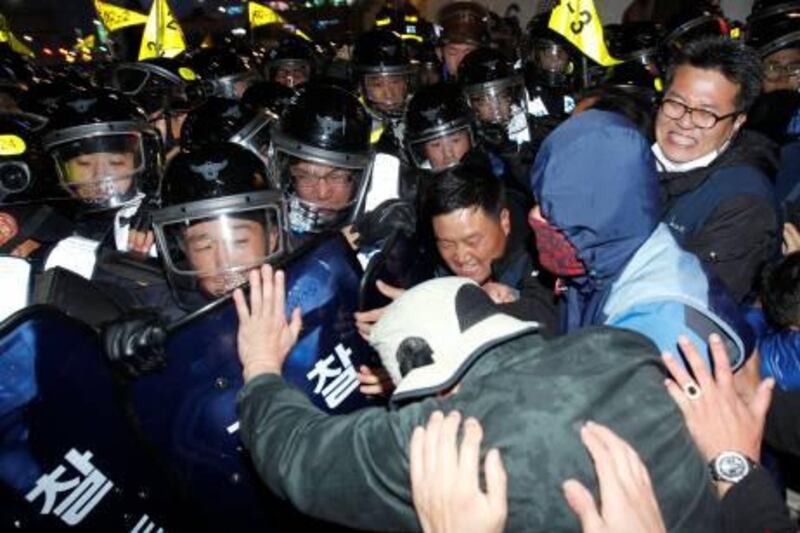SEOUL // Thousands of riot policemen faced off yesterday against tens of thousands of demonstrators in the South Korean capital, in a preview of the protests that are expected to greet the leaders of the world's most powerful nations when they gather here later this week to address the problems roiling the global financial system.
In the sprawling plaza in front of Seoul's city hall, demonstrators carrying paper cups glowing from lit candles, denounced the G20 summit and sang hymns and songs glorifying leftist parties and labour unions as they surged toward police massed behind huge new riot-control vehicles deployed for the first time.
Columns of policemen in full riot gear prevented the demonstrators from marching on government buildings and the US Embassy. Earlier in the day, leftist political and labour leaders shouted slogans and gave speeches denouncing South Korea's president, Lee Myung-bak, for using a meeting of the leaders of the G20 - the Group of 20 nations made up of 19 countries and the European Union - "as an excuse to repress democracy, human rights and fundamental labour rights".
A statement issued by protest organisers said a law passed by Mr Lee's government to ensure security at the summit "hinders freedom of assembly and cracks down on migrant workers, street vendors and the homeless" in the name of "cleaning the streets".
Police fired water cannons and small blasts of tear gas at some of the more belligerent demonstrators, and they were clearly relieved when the throng of protesters broke up into smaller groups and scattered down side streets, shouting slogans and singing songs but basically holding back on the threat of violence.
They demonstrators promised, however, to return in full force on Thursday, the first day of the two-day summit, when they plan to rally in front of Seoul station and march as close as possible to the National Museum, where the leaders and their entourages are scheduled to attend a reception.
Mr Lee, visiting the vast Convention and Exhibition Centre where the leaders will hold meetings, warned that "any small incident could undermine the whole event."
Despite the prospect of further protests, the worst problem facing the summit may be how to circumvent the issue of currency revaluation, which will be the number one item on the summit agenda.
Barack Obama, the US president, and Hu Jintao, China's president, are expected to discuss the topic when they dine with other world leaders on Thursday night in the National Museum. They will not hear the shouts of the demonstrators outside, but may find whatever is said within those dignified surroundings far more unsettling.
The United States has added to concerns by deciding to buy US$600 million (Dh2.2b) in government bonds, in hopes of stimulating its own economy. Critics say this will depreciate the value of the dollar in the face of other countries failing to meet US demands for revaluing their own currency.
The Chinese have signalled their opposition to the US move, asking why they should do anything about the value of the Chinese yuan when the US insists on lowering the value of the dollar.
China has a long list of sympathisers on that score, including all the other nations lumped together as BRICs - the acronym for Brazil, Russia, India and China.
Despite vast differences among these nations, they have come to form a loose grouping due to their geographical size, high populations and aspirations to compete with the long-established industrial powers in the Group of Seven - that is, the G7, which comprises the US, Canada, Britain, France, Germany, Italy and Japan.
The operative phrase for the American move is "quantitative easing", commonly known among the financial cognoscente as "QE2" - not to be confused with the QE2, as the great British passenger ship Queen Elizabeth II was known when it sailed the seas years ago.
Korean summit organisers are hoping that the Americans will not arrive in Seoul with strengthened demands.
They will be relieved if they settle on the waffling language hammered out by G20 finance ministers and central bank governors last month, when they agreed to resolve "currency imbalances" but failed to say how - or who - would enforce whatever they did.
Choi Hee-nam, coordinating policy statements among G20 conferees, said he hoped the US Federal Reserve Bank chairman, Ben Bernanke, "had listened to other countries" and "minimised the size of the QE" that he had in mind.
As far as the protesters are concerned, the whole G20 is anathema, no matter which of its participants are speaking.
"The government is trying to stop all protest," said Kim Young-hoon, protest leader and president of the Korean Confederation of Trade Unions, which includes about 600,000 workers, mainly in "metal" industries such as motor vehicles and shipbuilding. "We give a stern warning to the government not to continue this type of crackdown."
At the demonstration, a favourite image on posters was that of a rat that looked like Lee, the president. Protesters noted gleefully that the Korean word for rat is "Jee", pronounced just like the "G" in G20.
Protesters assailed the government for maintaining what they said was a black list of foreigners who are excluded from entering Korea. So far the government has reportedly turned back several thousand would-be visitors that it deemed potential troublemakers.
Among them was a noted "protest musician" from the Philippines, Jess Santiago, who sought to enter Korea with several other activists.
"We asked for a written explanation why we are blacklisted," said Maria Lorena Macabuag of Migrant Forum Asia, who was held overnight at Seoul's Incheon International Airport. "They told us they will get back to us," she said in a text message to Manila newspapers. "I think they are in a hurry to send us back home but, since we asked for a written explanation, they are delaying things."





